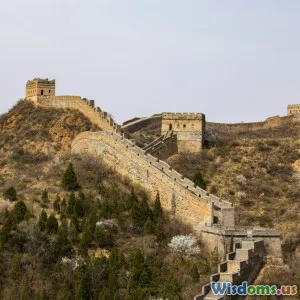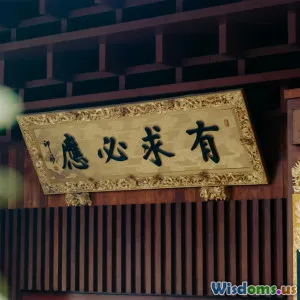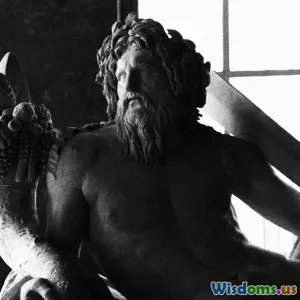
Comparing Laozi and Confucius Philosophies in Daily Life
9 min read Explore how Laozi's and Confucius' philosophies uniquely shape daily living and personal growth today. (0 Reviews)
Comparing Laozi and Confucius Philosophies in Daily Life
Introduction
In the vast tapestry of Chinese philosophy, two figures stand out as timeless intellectual pillars: Laozi and Confucius. Their teachings have transcended millennia, shaping not only ancient China but also offering profound guidance for contemporary daily life. While their philosophies appear contrasting at first glance—Laozi with his reverence for nature and spontaneity, Confucius emphasizing social order and moral duty—both systems elevate the pursuit of harmony and meaning. But how do their thoughts translate into daily living today? This article embarks on an insightful journey, comparing Laozi and Confucius’ philosophies to illuminate practical applications, inspire personal growth, and help readers navigate modern complexities with ancient wisdom.
Laozi: Embracing Natural Flow and Simplicity
The Core of Laozi’s Philosophy
Laozi, the attributed author of the Tao Te Ching, advocates for living according to the Tao—the natural way or path that underlies the universe. His philosophy centers around wu wei (无为), a principle meaning "non-action" or "effortless action." Far from passivity, wu wei encourages acting in harmony with natural rhythms, avoiding forced effort or resistance.
Laozi elevates qualities such as humility, simplicity, patience, and contentment. Rather than controlling life, he proposes surrendering to it, allowing events to unfold naturally. His famous line, "A journey of a thousand miles begins with a single step," encapsulates progress through mindful, unobstructed flow.
Practical Applications in Daily Life
In modern contexts, Laozi’s ideas translate into:
- Stress reduction and mindfulness: Taking breaks to observe and adapt rather than push through, enabling greater mental clarity.
- Flexibility in problem-solving: Instead of rigid plans, approaching challenges with openness and responsiveness—as water flows to fill any container.
- Embracing simplicity: Minimizing unnecessary desires or complexities, fostering contentment with less. For example, the minimalist movement echoes Laozi’s exhortation to simplicity.
Consider a workplace scenario where a manager utilizes wu wei by not micromanaging but offering guidance and letting employees find their way. This can boost creativity and reduce burnout.
Laozi’s Influence in Contemporary Culture
Laozi's philosophy profoundly impacts modern practices like tai chi, qigong, and certain therapeutic approaches that emphasize flow and energy balance. In leadership realms, the concept of "leading by letting go" has found resonance with executives advocating for more adaptive, servant leadership styles.
Confucius: Order, Virtue, and Social Harmony
The Essence of Confucian Thought
Confucius, or Kongzi, promotes a philosophy grounded in ethical responsibilities, filial piety, and adherence to societal roles. The notion of ren (仁), often translated as humaneness or benevolence, serves as the moral foundation.
Confucius believed that a well-ordered society is achievable through virtuous individuals fulfilling their roles conscientiously—whether as family members, rulers, or citizens. Ritual propriety (li) emphasizes respect and proper conduct, fostering trust and stability.
Practical Implementation in Daily Living
In contemporary life, Confucian philosophy inspires:
- Strong family values: Respecting parents and elders remains highly relevant across many cultures today, often linked with emotional well-being and social support networks.
- Community involvement and civic duty: Emphasizes contributing to social harmony by fulfilling responsibilities conscientiously, such as volunteering or engaging in fair business practices.
- Self-cultivation: The pursuit of moral education and continuous personal improvement resonates with lifelong learning trends and ethical leadership.
For instance, someone embracing Confucian principles might consciously practice gratitude and respect within family rituals or uphold integrity in professional environments, strengthening trust and cooperation.
Confucianism’s Endurance and Modern Relevance
Today’s Asian societies often reflect Confucian ideals in educational priorities and governance structures. Moreover, Confucian teachings influence global discussions on ethical leadership and corporate social responsibility, reminding us that societal well-being depends on cultivating virtuous individuals.
Contrasting Philosophies: Harmony Through Different Paths
View on Human Nature and Society
Laozi’s philosophy generally suggests a return to a primordial natural state, implicitly viewing human artifice and societal constraints as potentially problematic. Confucius, conversely, asserts that human nature is shaped and refined through culture, education, and ritual.
While Laozi advocates spontaneous alignment with nature, Confucius promotes structured order and moral cultivation. Yet both seek harmony: Laozi through internal alignment with the Tao, Confucius through external social harmony.
Approach to Action and Decision-Making
Where Laozi counsels effortless action and patience—waiting for the right moment—Confucius champions deliberate effort and moral rectitude.
For example, in conflict resolution, a Laozi-inspired approach might be to withdraw or soften positions to avoid tension, whereas Confucian methods might stress communication grounded in respect and protocol.
Practical Balance for Modern Individuals
Many modern thinkers suggest integrating these philosophies offers the richest guidance. One might follow Confucius’ ethics in professional conduct and family responsibilities, while employing Laozi’s wu wei to manage stress and adapt fluidly to changes.
This balancing act can foster resilience: take purposeful action per Confucius, but avoid forcing outcomes per Laozi.
Real-World Examples: Philosophy in Action
Example 1: Leadership Styles
- A Confucian leader emphasizes hierarchy, respect, and collective goals to maintain order.
- A Laozi-influenced leader encourages autonomy, trusting that natural creativity will guide the group.
Combining both styles creates a leader who upholds standards but is open to innovation.
Example 2: Personal Well-Being
- Applying Laozi’s simplicity can reduce attachment to materialism, improving mental health.
- Confucian practice of ritual, such as family dinners or community ceremonies, builds meaningful connections.
Together, they nurture both inner peace and social fulfillment.
Example 3: Environmental Attitudes
Laozi’s harmony with nature inspires sustainability and eco-conscious habits. Confucius’ emphasis on social responsibility supports collective environmental stewardship programs.
Conclusion
Laozi and Confucius provide complementary lenses through which to view and navigate daily life. Laozi teaches us the art of flowing with natural currents, releasing resistance to cultivate peace. Confucius reinforces the importance of ethical living, social roles, and continuous self-improvement to build a just and harmonious society.
Incorporating both philosophies encourages a holistic lifestyle: one tempered by moral clarity and enriched through acceptance of life’s ebb and flow. Whether managing relationships, handling stress, or pursuing goals, blending Laozi’s effortless action with Confucius’ purposeful diligence offers a profound roadmap for meaningful living.
As modern life grows increasingly complex, revisiting these ancient teachings can inspire balance, deeper understanding, and graceful resilience in our everyday journeys.
Rate the Post
User Reviews
Popular Posts



















